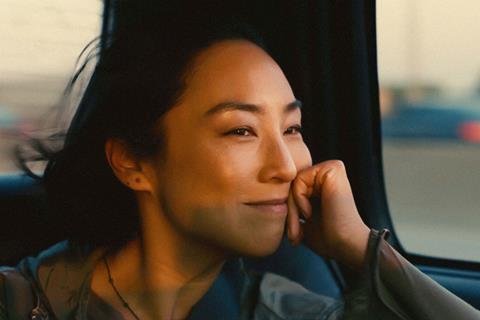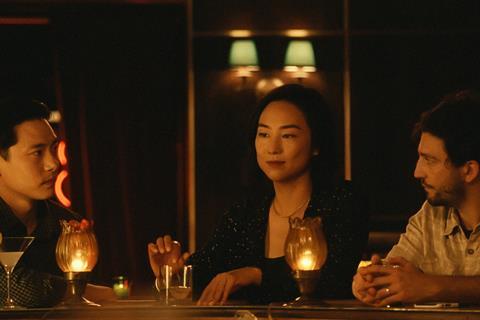Greta Lee landed a sensational career break in Celine Song’s Past Lives, playing a woman shifting between Korean and American identities

The inspiration for Celine Song’s Past Lives — and the film’s defining image, of a woman sitting in a bar flanked by two men, her husband and her childhood sweetheart — was based on a real moment in the writer/director’s own life. But the film also became very personal for the actress playing that woman, Greta Lee, involving a deep dive into her identity as a Korean American.
While her experience is different to that of her character Nora, Lee says she understands the “pivoting and the navigating that you have to do on a daily basis”. And language is a big part of that. “Just the sheer amount of Korean that I had to speak in this movie — I’m not speaking that much, living in America. Many people were shocked to know that I speak Korean at all, which proves how much it was sort of tucked away. So, I was accessing this part of myself, my Korean identity, for Nora, and honouring the reality of what it’s like to be bicultural and bilingual. I felt I was uncovering some parts of myself that I’d said goodbye to.”
Past Lives follows Nora, first as a 12-year-old who emigrates from South Korea to Canada with her parents. Twelve years later she reunites, online, with her Korean childhood sweetheart; another 12 years later, they meet in person, in New York, where Nora is now married to an American.
Beginning with its Sundance premiere in January, and through the release, including in the US via A24 and UK with Studiocanal, the film has become one of the year’s most talked-about independent features, putting the spotlight fully on the actress for the first time in her career. Not surprisingly, she recalls her reaction when first reading the script.
“I got an email from my agents. I think the subject line was something like, ‘Do you speak Korean?’ I thought, ‘Urgh, God, okay.’ I didn’t know who Celine was, I didn’t know anything about it, going in. But then I opened the PDF and read it in one sitting and just had a very cathartic, visceral response. I was floored.
“This was new in so many different ways,” Lee continues. “It was certainly the professional opportunity of a lifetime for me. I’ve never been number one on the call sheet before, after so many years of doing this. But aside from that, it stood the entire convention of a romantic drama, and a love triangle, on its head.
“Getting to tell the story in this way, through its specificity, felt very groundbreaking,” she adds. “We were telling a love story from the perspective of an immigrant living in America, but it wasn’t about that. Sometimes in the past I’ve had to do a lot of the heavy lifting in trying to explain what my experience is like, to decode it for a perceived audience, and not getting to the good stuff. And this movie is just the good stuff.”
Lee was born in Los Angeles, to Korean immigrants — her father a doctor, her mother a concert pianist. She studied drama at Northwestern University in Illinois before pursuing a career on the New York stage. “I’m obsessed with the theatre,” she says, recalling the early desire to be the next Vanessa Redgrave or James Earl Jones. “It was a tie,” she laughs, “the vocal power of both, that kind of presence. They could not be further from the reality of who I am and what I bring to the table, but I had very grand aspirations.”
Lee made her debut on Broadway in 2007, then in 2010 appeared on the London stage alongside Mark Rylance and Joanna Lumley in the Moliere-inspired play La Bête. “I learned how to smoke cigarettes from Joanna Lumley,” she laughs. As for Rylance: “That experience was seminal. His rehearsal process was wild, so liberated, I felt jealous of his sense of freedom. I think he took his clothes off once, just to try.”
Comedy turns

Back in the US, she started to work consistently in both television and film, notably in female-led comedy: Girls with Lena Dunham; Inside Amy Schumer (Schumer offered her a role in the sketch show after the pair met in an elevator, following failed callbacks for a Noah Baumbach film); Sisters with Tina Fey and Amy Poehler; and latterly Russian Doll with Natasha Lyonne.
She has also done drama, for example Apple TV+’s The Morning Show, but admits that until Past Lives she was been best known for comedy. “It’s been part of a larger cultural conversation — Russian Doll, a show like Girls. I came up during this moment of female comedians. And starting out, they were essential in giving me chances to work,” says Lee, who is currently adapting Cathy Park Hong’s essay collection Minor Feelings: An Asian American Reckoning for FX/Hulu, with A24 and Onyx, which she will also star in and executive produce.
Given the importance of language in Past Lives, Lee requested “a very specific kind of dialect coach” and chose Sharon Choi, perhaps most familiar as Bong Joon Ho’s interpreter. “I wanted someone who wasn’t a conventional coach and wasn’t going to just wipe me clean of my flaws — essentially, of my American-ness,” she explains. One of their aims was to subtly delineate Nora’s exchanges with childhood friend Hae Sung (Teo Yoo), making her sound more Americanised at the outset, then more Korean as the characters progress through unseen hours of conversation.
The cast’s preparation with each other reflected the relationships on screen. Before they met in person, Lee and Yoo would send video messages and speak online. “In real life we did have a meeting of minds, in terms of East and West, in our conversations. And it was helpful for when Nora and Hae Sung are reunited as adults — this collision of his Korean-ness and my American-ness.”
During the New York filming, Yoo and John Magaro (playing Nora’s husband Arthur) were not allowed to meet until they first shared a scene together — and Lee reports that her co-stars felt just as curious about each other as Arthur and Hae Sung. “John would ask me things like, ‘He’s obviously very attractive. But is he funny?’ And Teo had his own concerns: ‘How good is John? Is he better than me?’ There was a friendly competition.”
Ironically, the role of a lifetime almost eluded Lee, as Song’s characters were originally conceived as being in their late 20s. “I was actually rejected the first time around. It felt like, ‘Oh, I have such a connection to this material but it’s not in this lifetime.’ And I’d made peace with that.
“Then a full year later, I got a call out of the blue that said it was open again and they’re casting older actors. Celine and I met the following day. And after talking and reading through some scenes, she offered me the job on the spot. She has said that with Nora and myself it was a matching of souls.”







![The Brightest SunScreen[Courtesy HKIFF]](https://d1nslcd7m2225b.cloudfront.net/Pictures/274x183/3/5/0/1448350_thebrightestsunscreencourtesyhkiff_312678.jpg)
















No comments yet